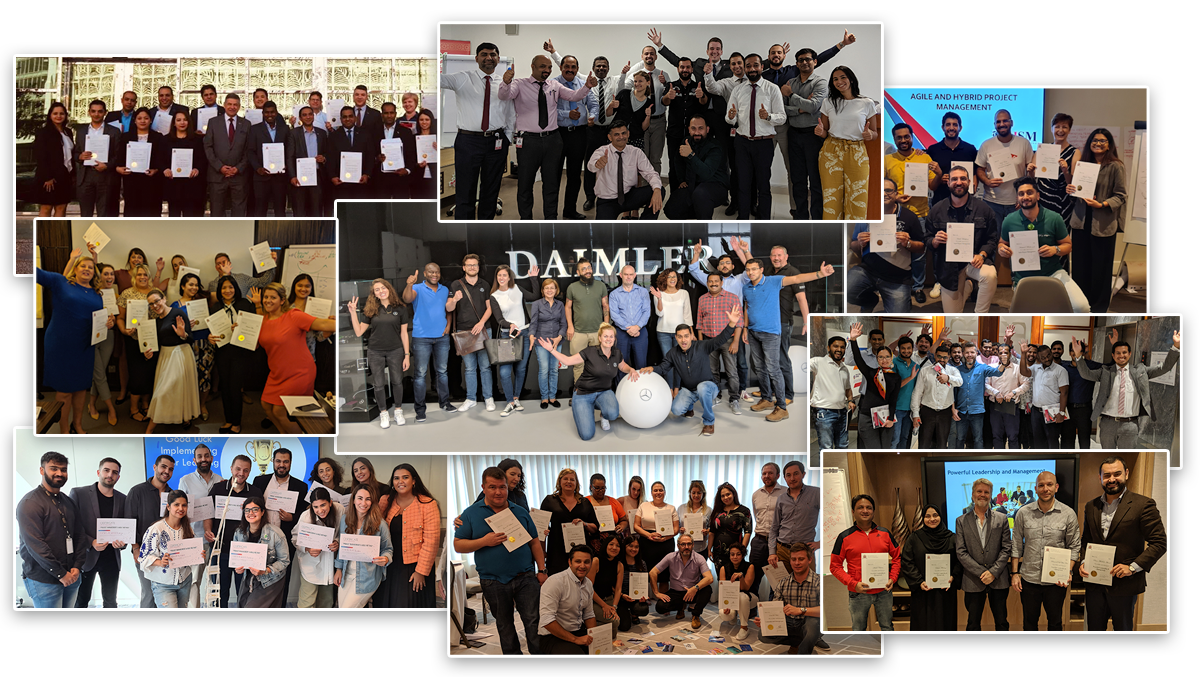Effective leaders manage big responsibilities, tight deadlines and daily challenges, making leadership and stress management closely connected. While some stress can help with focus and motivation, too much can hurt productivity, wellbeing and job satisfaction.
Understanding the causes of stress and recognising the warning signs can help you manage it before it leads to burnout.
This article covers workplace stress, its signs and simple ways to stay balanced and focused while leading with confidence.
Why Trust ISM Training?
Over 20,000+ graduates
Have advanced their career with ISM Training
89%
of ISM graduates say our course helped them get a promotion.
76%
said that their training helped then increase their salary.
97%
of graduates want to study more of our courses.
Our graduates are working in some of the biggest companies worldwide, companies like...






Understanding stress
Stress is the body’s natural response to pressure. When it builds up too much, it can feel overwhelming.
Stress is the body’s natural response to pressure. When it builds up too much, it can feel overwhelming.
Your body releases stress hormones to help you face challenges, triggering the “fight or flight” response. Once the pressure eases, these hormone levels usually return to normal.
Stress can be helpful in situations like taking on a leadership role, getting a promotion, or dealing with big life changes.
However, constant stress can have negative effects. When stress does not go away, it becomes harder for the body to recover, leading to long-term physical and mental strain.
For leaders, managing stress well is important to stay focused, resilient and healthy.
Signs of stress
As a leader, stress affects not just you but also your decisions, communication, and how you support your team.
Recognising the warning signs early can help you stay in control and perform at your best.
Common symptoms of stress in leadership include:
- Poor sleep (insomnia) – Trouble falling or staying asleep, leading to fatigue and less focus
- Frequent headaches – Tension headaches or migraines caused by ongoing pressure
- Increased reliance on alcohol, caffeine, or unhealthy habits – Using substances to cope with stress
- Anxiety or constant worry – Overthinking decisions, second-guessing yourself, or feeling overwhelmed
- Changes in appetite – Eating too much or too little due to stress
- Low confidence and negative self-talk – Doubting your abilities or feeling like an imposter
- Difficulty concentrating – Struggling to focus, make decisions, or stay productive
- Frustration – Losing patience with colleagues, making emotional decisions, or getting easily annoyed
- Dizziness or feeling lightheaded – Physical signs of stress affecting your wellbeing
- Muscle tension and body aches – Stress causing stiffness, pain, or tension in the body
By noticing these signs, leaders can take steps to manage stress, stay strong and lead with clarity and confidence.
Start your course today!
We offer a comprehensive curriculum that covers all of the essential topics. Our experienced instructors will provide you with the support and guidance that you need to succeed.
Why leaders experience stress
Being a leader is hard. Stress comes with managing a team, making big decisions, and handling many tasks.
In fact, a 2022 study shows that 41% of senior leaders experience high levels of stress.
Common reasons for leadership stress include:
High expectations and responsibility
Leaders must make critical decisions, drive results and ensure their team’s success. The weight of these responsibilities—whether for employees, clients, or stakeholders—can feel overwhelming.
Constant problem-solving
Leaders face daily challenges, from resolving conflicts to making tough decisions under pressure. Being constantly “on” and ready to adapt can be mentally exhausting.
Workload and time pressure
Time and stress management often go hand in hand. For leaders, handling deadlines, multiple projects and urgent tasks often means long hours and fewer breaks, leading to more stress.
Difficult team dynamics
Handling conflicts, poor results, or disengagement can create emotional strain. Balancing being supportive while holding people accountable is stressful.
Uncertainty and risk
Leaders often work in changeable environments, where economic shifts, market changes, or company restructuring add uncertainty. Making decisions with incomplete information increases stress.
Feeling isolated
Leadership can feel lonely. You may not always have someone to turn to, and the pressure to appear strong and confident can make it hard to share struggles.
Work-life imbalance
Leaders often prioritise work over personal needs, leading to burnout. Struggling to disconnect from work and maintain a healthy balance adds to stress.
Fear of letting others down
Many leaders put immense pressure on themselves to succeed. The fear of making a wrong decision, disappointing the team, or failing expectations can be a major stressor
We let our graduates do the talking...
Helpful strategies: stress management for leaders
We know that too much stress can cause health issues.
What many people do not realise is that high stress levels can also hurt business performance.
Ongoing stress can affect decision-making, lead to burnout, and cause employees to leave.
By understanding stress, you can recognise when employees are struggling and take steps to improve the workplace.
Here are some ways to reduce stress at work:
1. Assign the right roles to the right people
When someone dislikes their job, they are less likely to be productive.
As a leader, observe your team members and build rapport with them. When you understand their strengths and interests, you can assign tasks they find more engaging.
2. Set boundaries
A major stressor is being contacted outside of working hours.
As a leader, set an example by avoiding emails and messages outside work hours whenever possible. Respect your own boundaries and encourage your team to do the same.
3. Stay calm and lead by example
Your team looks to you for guidance. If you panic under pressure, they will too. A stressed leader creates uncertainty, making things feel worse for everyone.
To reduce stress, stay composed, maintain your routine and project a positive attitude. When your team sees you handling challenges with confidence, they will feel reassured.
4. Set clear, manageable goals
Uncertainty causes stress. People feel anxious when they do not know what to do or how to contribute.
Set clear objectives and outline steps to achieve them. When everyone has a purpose, they stay focused on tasks instead of worrying about the unknown.
5. Keep your team informed
Lack of information leads to rumours and anxiety. Keep your team updated on relevant changes. Transparency builds trust and prevents unnecessary speculation.
6. Prioritise wellbeing
Encourage regular breaks, fair workload distribution and a balanced work environment. Studies show that working for 90 minutes followed by a 20-minute break can improve efficiency.
7. Foster teamwork
Encourage collaboration by sharing workloads and setting collective goals. Strong teamwork reduces stress and improves efficiency. Consider occasional team-building activities to strengthen relationships.
8. Recognise and reward hard work
When you value employees, they feel motivated. Recognise achievements, even small ones. Simple words of appreciation can boost morale and motivation.
Looking further ahead?
View our course calendar in full
Enhance your stress management skills with ISM
ISM’s Time and Stress Management course helps executives and managers handle workplace stress and perform at their best. A key focus is time management, helping leaders prioritise tasks, set realistic deadlines, delegate efficiently, and avoid procrastination.
At ISM, we offer world-class leadership training to enhance both productivity and wellbeing. We have many years of experience. We have been in the UAE since 1998. We understand the challenges that leaders face in difficult situations.
Invest in your leadership potential. Contact ISM Dubai today to learn about our Time and Stress Management program. Start your journey towards balanced and effective leadership.
Frequently Asked Questions
Leaders face high expectations, tight deadlines and constant decision-making, which can lead to burnout. Managing stress helps maintain focus, resilience and a positive work environment.
Signs of stress in leaders include:
- poor sleep,
- frustration,
- headaches,
- trouble concentrating, and
- reliance on caffeine or unhealthy habits.
Recognising these early helps leaders take action before stress negatively impacts their performance.
Leaders can manage stress by setting clear goals, delegating effectively, handling tasks efficiently, and promoting open communication.
Encouraging work-life balance and recognising achievements also help reduce stress.
Poor time management increases pressure.
Setting realistic deadlines, avoiding procrastination, and delegating tasks help leaders stay in control and feel less overwhelmed.
ISM’s Time and Stress Management course offers support and resources to help employees handle stress effectively. This programme is designed to reduce workplace stress, improve employee wellbeing, and boost productivity.
By offering such programmes to their team members, employers can create a healthier work environment and reduce burnout.
Join 1000's of individuals and teams certified by the Institute of Sales & Marketing

Our trending courses
At ISM, we combine top-tier training courses with industry-leading instructors.
View all coursesTestimonials from Our Valued Clients
Discover the transformative experiences our clients have had with our training programs.
Hear directly from those who have unlocked their potential and achieved remarkable success.

Some other providers courses can be quite a chore! However, I felt fully engaged and excited by all the new selling tools I have...

Daniel Graham

Instead of just telling me what to do, they showed us how to do it as well as why to do it. They used real-life experiences...

Sujit Nair

The training was delivered in an easy to absorb manner and focused on all the key areas...

Paul Baker CFP



